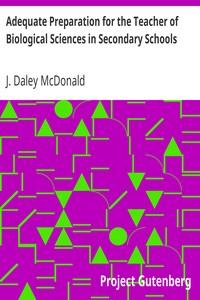Read this ebook for free! No credit card needed, absolutely nothing to pay.
Words: 13133 in 4 pages
This is an ebook sharing website. You can read the uploaded ebooks for free here. No credit cards needed, nothing to pay. If you want to own a digital copy of the ebook, or want to read offline with your favorite ebook-reader, then you can choose to buy and download the ebook.


: Adequate Preparation for the Teacher of Biological Sciences in Secondary Schools by McDonald J Daley James Daley - Teachers Training of
Introduction 3 Retarding factors in improvement 4 Qualifications in subject matter 5 Scope of Biology 6 Values and relations of Biology 7 Adaptation of course to community conditions 10 Freedom from textbook slavery 11 Materials and laboratory equipment 12 Historical setting 13 Spirit of research 14 Qualifications in method 16 Factors determining correct method 16 History of scientific method 17 Problem method 17 Accuracy and logical constructive thinking 18 Teacher's final method necessarily unique 19 Summary of necessary qualifications 19 Opportunity for adequate preparation 20 Lack of professional course 20 Requirements of Teachers Recommendation in Zoology 21 Courses not adapted for teacher-preparation 22 Professional course the goal 23 Suggested modifications of present courses 24 Course in special methods 25 Practice teaching 27 Bibliography 29
In attempting to explain the slow pace of improvement in the quality of preparation for the teaching of science, one becomes involved in a cycle. Science had its development in the college and university whence it diffused slowly into the secondary schools, and finally slightly into the elementary grades. The differences between the aims of college science and secondary school science were and still are not taken sufficiently into account. As an inevitable result there are to be found in the curricula of high schools too many science courses that are mere dilutions of the college type, with no modification of purpose, and just enough change in method and subject matter to bring them partially within the power of understanding of the less mature mind. This situation in turn reflected upon the higher institutions of learning in such a way that it seemed that they were giving adequate training of the correct type. And such would have been the case had the college course in the particular science been planned for the express purpose of being diluted to suit secondary school needs. But it will be generally conceded that such courses never have existed.
Another retarding factor in the evolution of the problem has been the subordination of special training in subject matter to other really less important qualifications, in the selection of teachers. The table given below, compiled from statistics gathered in one of the States during 1916, shows sufficient justification for the above statement. And not only has the preparation in subject matter been too little considered in choosing teachers, but also in the administration of schools specially intended for teacher-training. An educator of high standing in California is credited with making the criticism of the Normal Schools of the State; that they attempt to teach a person how to teach intelligently something about which he knows nothing. When teachers have adequate preparation in subject matter as well as in methods, and when they are employed to teach only those subjects for which they are fitted, then the problem of maintaining a high standard of teaching will be well nigh solved.
Preparation in Subject Matter
Before facing the problem of preparation for the teaching of biological sciences in the secondary schools, there must be a clear conception of the aims and legitimate purposes of these sciences in the high school. We are fortunate in having the aims of biology clearly and concisely stated by the Commission on the Reorganization of Secondary Education of the N.E.A. . These aims will not be considered in their entirety but only in so far as they bear directly on the problems that follow. Before proceeding further, for simplification we will assume that the teacher is assigned to teach biological sciences only. Even then the field is quite comprehensive, for besides instruction in general biology, there will be courses of a more advanced type, in Zoology, Botany, Physiology, and often Bacteriology, Sanitation, or Agriculture. However, with preparation in the fundamentals necessary for biology a teacher should be able to conduct such courses without difficulty. Thus the problem is sufficiently inclusive if it concerns preparation for biology alone.
A paramount aim is the improvement of living conditions, both as it concerns measures for group sanitation and factors in the health of the individual. This should be the almost exclusive aim in those parts of the course dealing with bacteria and disease, and the biology of man, or physiology and eugenics. Biology has many applications in our economic life. It is the very foundation of agriculture. The lumber industry is beginning to find that there are biologic laws. The Government of the United States some time ago established a Bureau of Fisheries for the purpose of studying the biological problems involved in the continuance and furtherance of our extensive fisheries industry.
So far as the individual is concerned, biology should train him to observe life phenomena accurately and to form logical conclusions, through the use of problems. This ability is a valuable asset whatever his life work may be. Also, if it is the right kind of a course, and well taught, it will enrich the life of the boy or girl through the aesthetic appeal of plants and animals, and so make possible a sincere appreciation and enjoyment of nature. In addition, the study of biology should make clear to the pupil the important part that the intensive study of the various biological sciences has played in the whole marvelous scientific progress of the past centuries.
Along with these values certain relations of biology must be well understood if it is to be well taught. These relations may be conveniently segregated into five groups, 1) relations to world problems, 2) to problems of the state, 3) to the community, 4) to the school curriculum, and 5) to individual pupils. To world problems biology bears many relations, for example, it is fundamental in the analysis of immigration problems, especially those phases concerning health, over-population, and the probable hereditary effects of assimilation through hybridization. State problems of health protection, conservation of game and forests, control of rodents and other crop pests, and others can only be solved after gaining a thorough knowledge of the underlying natural laws, and acting in accordance with them. How inadequate a game conservation law of closed season, without regard to the breeding habits of the animal concerned! Again, State regulations regarding the care of mentally deficient, especially in the prevention of intermarriage, must be given consideration from the biological as well as the ethical point of view.
Relations to class and to individual will be considered in conjunction with teaching methods.
The values and interrelations of biology have been discussed at some length because they must serve as criteria in deciding what constitutes adequate preparation.
The comprehensiveness and vital nature of the subject, biology, present at once an inspiration and an element of fear to the conscientious teacher. They cause him to regard in utter amazement, the applicant for a position who in answer to question replies "No, I have never taken any courses in biological Science, but I can easily prepare myself to teach it, if need be." The impossibility of such impromptu development of skill in the teaching of biology will become more apparent as we proceed.
Besides a full appreciation of the aims and relations of the subject, the teacher must be able to construct a course especially adapted in content to the peculiar needs of the particular community. This follows from what was said of relations in a previous paragraph. The development of such a course demands sufficient knowledge of economics and sociology to make possible a correct analysis of local conditions and so find what is required. The course to fulfill the requirements will necessarily be to some extent new, and just to such extent may the teacher feel something of the inspiration of the pioneer. Relative values must be established; emphasis must be properly placed--life of distant regions should not be taught except as local material may not be available to illustrate some very essential point, yet too often a carefully pickled grasshopper is transported from Florida to California, there to be dissected by some unfortunate high school lad. Not only must the larger divisions of the course be carefully balanced and tested for value, but each lesson must justify its induction into it. It is at this point that the relation to the individual is the chief criterion.
Free books android app tbrJar TBR JAR Read Free books online gutenberg
More posts by @FreeBooks

: History of the Great American Fortunes Vol. I Conditions in Settlement and Colonial Times by Myers Gustavus - United States Economic conditions; Wealth United States


: The Princess Idleways: A Fairy Story by Hays Helen Ashe - Fairy tales; Conduct of life Juvenile fiction; Children Conduct of life Juvenile fiction; Fairies Juvenile fiction; Magic Juvenile fiction; Princesses Juvenile fiction; Wealth Juvenile fiction; Elve





